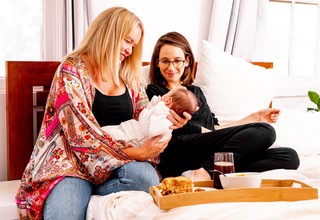
Let’s Talk about Birth
For many years in this country the traditional team of Midwife and Obstetrician has prevailed in the maternity model. Sometimes a Paediatrician would step in after birth, or maybe even a lactation specialist if you were lucky. But mums – and their partners – were largely left out of the decision on how they wanted to birth their baby. Things are changing, but it’s slow progress, as is evidenced in the incredible documentary Birth Time[i], recently produced by Zoe Naylor, Jo Hunter and Jerusha Sutton. A must watch for anyone contemplating having a baby.
What that documentary clearly highlights is the need ‘continuity of care’ in the maternity care model, which is a long way from what we currently have,
A few statistics
If you need convincing that the maternity model in Australia is broken, here are a few statistics:
- Only 0.4% of women in Australia choose to have a home birth
- Only 8% of women birthing in Australia even have access to continuity of care in pregnancy, birth, and postpartum
- The Caesarean rate in Australia is now 34%. The World Health Organisation asserts a rate of 10-15% provides optimal maternal and baby health outcomes[ii]
- 30% of women describe their birthing experience as ‘traumatic’[iii], which can often be linked to postpartum depression
These statistics are the result of the over-medicalisation of what is a natural process – birth. And with medicalisation come legal implications and cost factors, and obstetricians and midwives who are constrained by this system.
What is Continuity of Care?
Pregnancy, birth and the postpartum period is an extraordinary time. It can also be incredibly challenging and bewildering. It is different for everyone, and every birthing mother brings her own concerns, experiences and expectations to the process.
The concept of Continuity of Care is based on the idea that every pregnant and birthing mum has one single point of contact, with whom she can develop a close and trusting relationship. Someone who can take the time to understand those concerns, experiences and expectations and provide advice and care accordingly. Someone who will provide the knowledge to allow mums and their partners to make genuine realistic choices, and co-ordinate or introduce specialist care if it is needed.
Continuity of care should extend from pregnancy, through birth and into the postpartum period. If all these factors are in place, the opportunity for a ‘good’ birth is drastically increased.
What is a ‘Good’ birth?
A good birth is not just a birth where mother and baby survive the experience. It should be so much more than that. Ann Drapkin Lyerly is an obstetrician and bioethesist whose book ‘A Good Birth’ outlines five key factors for a ‘good’ birth.
- Feelings of personal agency – that you have a say in what is happening to your body
- Feelings of security – that you are confident the people around you are giving you advice that is in your own best interest
- Connectedness – that you have a shared vision for your birth and mothering experience with your support team
- Respect – that your support team respect your preferences and opinions
- Knowledge – that you understand what is happening, what your options are and what the potential outcomes might be
Yet Lyerly also found that women’s voices were increasingly being marginalised in their encounters with existing medical systems.
A ‘good’ birth is not necessarily one in which things all proceed according to plan. The key is how the birthing mum is treated, according to Lyerly:
“Treating women with dignity and respect throughout the entire birthing process matters far more than whether or not the birth is able to proceed ‘naturally’.”[iv]
How a Doula can bridge the gap between what is and what is needed
If we agree a ‘good’ birth is where a woman feels empowered, knowledgeable and respected, and receives continuity of care during pregnancy, birth and postpartum, and that the current medical system does not provide that, how do we find a way to achieve it?
This is where the role of a Doula can bridge that gap, between what the system currently provides, and what is needed by birthing mothers. In other words – continuity of care. Which in turn provides the greatest likelihood of a ‘good’ birth.
A doula will:
- work with a pregnant woman and her partner during pregnancy to ensure they are fully prepared for the birth of their baby
- support the birthing mum and her partner throughout the birth and help ensure they understand what is happening, and what their options might be throughout
- provide ongoing advice, guidance and support in the months of the postpartum period to help ensure there are no concerns around a range of things like breastfeeding, sleeping, postpartum depression and family dynamics, and recognising when additional expert involvement is required
World Doula Week – 22-28 March 2021
Women all over the world are starting to stand up for better representation, better treatment and a more balanced society. What could be more important than bringing the way women are treated during pregnancy and birth into the spotlight?
During World Doula Week is a great time to start a conversation with your friends and family, watch Birth Time, and think about how you or your loved ones will choose to move from womanhood to motherhood.
If you would like to talk about having a Doula provide continuity of care during your pregnancy, birth and postpartum period, please give me a call on 0422 258 771. or contact me below:
[i] https://www.birthtime.world/
[ii] https://apps.who.int/iris/bitstream/handle/10665/161442/WHO_RHR_15.02_eng.pdf?sequence=1
[iii] https://www.birthtime.world/
[iv] https://www.birthtime.world/